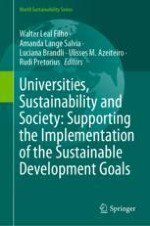In order to yield the expected benefits, sustainability initiatives need to be undertaken by means of a close cooperation between universities on the one hand, and societal partners on the others. The principle of co-creation and co-execution of sustainability initiatives increases the value for all by mutual learning, and the sharing of expertise and resources. But pursuing sustainability initiatives with a community and societal involvement is not simple. There is a perceived need for a better understanding of how universities can interact with society, in order to support the implementation of the UN Sustainable Development Goals.
This book is an attempt to address this need, by a novel approach which focuses on current potentials and challenges, across a wide range of fields and expertise. The book focuses on how the theory and practice of sustainable development interact and shows the need for a continuation of the dialogue among sustainability academics and practitioners, so as to address the issues, matters and problems at hand. The spectrum of themes addressed on this book also entails how environmental values and ethics are applied and the relationship between social, biological and cultural diversity. It also includes a broad disciplinary approach to sustainability, including education, research and case studies, and the links with human–environment relations in a sustainable development context.
